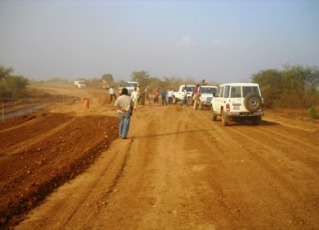CORRECTION: South Sudan pledges to improve physical infrastructure
By Ngor Arol Garang
October 31, 2010 (KHARTOUM) – Authorities from regional ministry of roads and transport in the Government of Southern Sudan on Sunday said the ministry hopes to draw up strategies to improve rail transport and ease congestions on major roads in the area.

“All over the world, rail transport is not only faster, but also helps in easing traffic, particularly in the major cities, which government will embark on seriously from next year,” Engineer Raymond Pitia Morbe, former undersecretary in the ministry of roads and transport told Sudan Tribune by phone from Juba.*
Morbe, the second most senior official in the ministry said the government of south Sudan has prioritized linking major towns with an improved road network.
“One of our priorities as government and especially in the ministry of roads and transport is to connect major towns in south Sudan with improved and accessibly road network,” said Morbe.
Expressing concern over financial constraints, he said the government is mobilizing resources from all sources including seeking assistance from donor communities to honor pledges they made after signing of the Comprehensive Peace Agreement in 2005, which ended 22 years of civil war.
“From next year, there will be massive infrastructural development in the region. There will be huge and visible infrastructural development taking place the south. This infrastructural development would comprise railway links, roads and other major facilities, which will not only increase our development, but will also create jobs for our people,” he noted.
Morbe said, the southern government “is also doing everything possible” to improve on the conditions of service of the construction workers, adding, “as soon as the sector becomes vibrant and productivity goes high, workers will definitely benefit better working conditions.”
The possibility of a train network in southern Sudan will remind some of the population especially in Northern Bahr el Ghazal of the increased conflict that the railway line to Wau caused during the north-south civil war.
As the trains were used to resupply Wau, which was a garrison town of the Khartoum government’s forces for much of the more, the railway was used to launch attacks on some areas along the route.
But the Morbe said that reviving and building railway lines is in line with government policy to bring social and economic services to rural areas through provision of affordable transport facilities.
“Railway links are one of the cheapest and most accommodative means of transport,” explained Morbe saying that he hoped a new network would improve trade.
He said that the nation should not let the railway sector fall into disrepair saying that the contribution of rail transport to the development of the economy should not be underestimated.
It was for this reason, Morbe said, that the Government of Southern Sudan is determined to arrest the decline of the railway system in the region.
Restoring the railways would be a platform to achieve the vision of south Sudan’s ruling party – the SPLM – to take town to rural areas to avoid mass urbanization.
.
“This is just the beginning of a sturdy journey to make our rail transport system an integral part of building a better south Sudan and I can assure you that this is the first step of a journey that would bring enormous joy and relief to many of our people in rural areas,” said the official.
He was optimistic that the train service would improve travel time between North and the South and reduce the inconvenience commuters go through every day.
(ST)
* The initial article stated that Engineer Raymond Pitia Morbe, is the undersecretary in the ministry of roads and transport. He left this role earlier this year and is now an adviser to the ministry of housing.

Anyang
South Sudan pledges to improve physical infrastructure
Word to the Ministry,
Action speak louder than a word,therefore there is a dire need for you to put things into action rather a word.